The Intel Skylake-X Review: Core i9 7900X, i7 7820X and i7 7800X Tested
by Ian Cutress on June 19, 2017 9:01 AM ESTBenchmarking Performance: CPU Office Tests
The office programs we use for benchmarking aren't specific programs per-se, but industry standard tests that hold weight with professionals. The goal of these tests is to use an array of software and techniques that a typical office user might encounter, such as video conferencing, document editing, architectural modelling, and so on and so forth.
Chromium Compile (v56)
Our new compilation test uses Windows 10 Pro, VS Community 2015.3 with the Win10 SDK to combile a nightly build of Chromium. We've fixed the test for a build in late March 2017, and we run a fresh full compile in our test. Compilation is the typical example given of a variable threaded workload - some of the compile and linking is linear, whereas other parts are multithreaded.
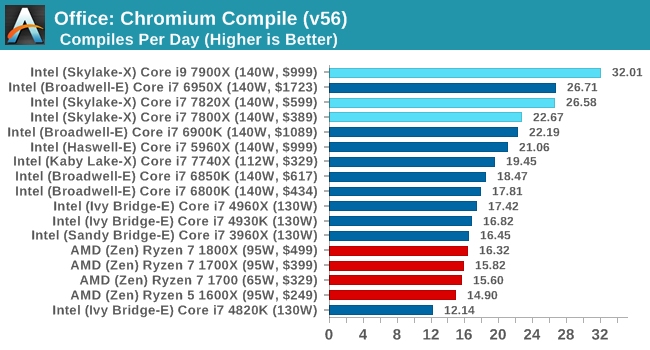
PCMark8
Despite originally coming out in 2008/2009, Futuremark has maintained PCMark8 to remain relevant in 2017. On the scale of complicated tasks, PCMark focuses more on the low-to-mid range of professional workloads, making it a good indicator for what people consider 'office' work. We run the benchmark from the commandline in 'conventional' mode, meaning C++ over OpenCL, to remove the graphics card from the equation and focus purely on the CPU. PCMark8 offers Home, Work and Creative workloads, with some software tests shared and others unique to each benchmark set.
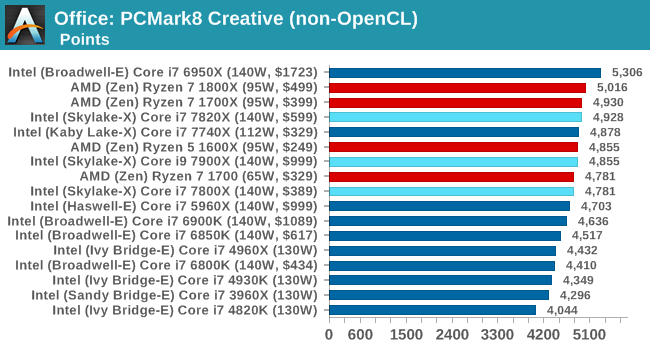
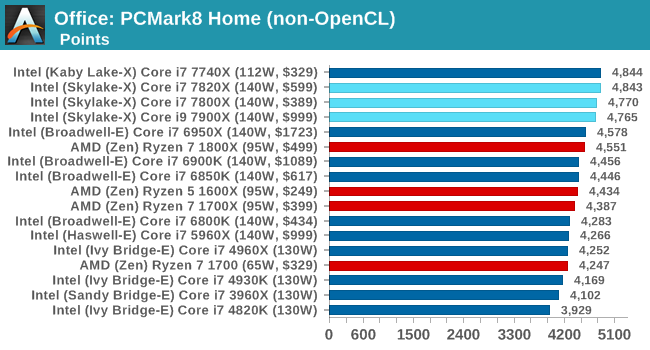
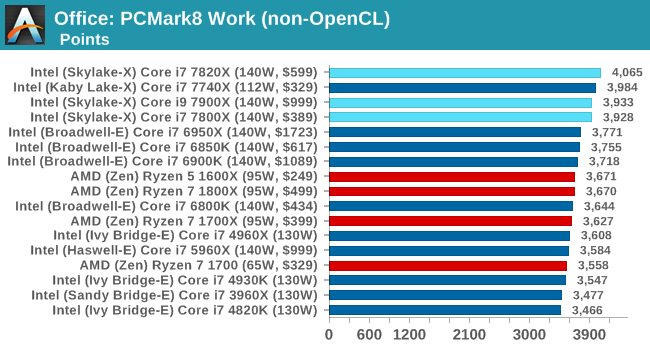
SYSmark 2014 SE
SYSmark is developed by Bapco, a consortium of industry CPU companies. The goal of SYSmark is to take stripped down versions of popular software, such as Photoshop and Onenote, and measure how long it takes to process certain tasks within that software. The end result is a score for each of the three segments (Office, Media, Data) as well as an overall score. Here a reference system (Core i3-6100, 4GB DDR3, 256GB SSD, Integrated HD 530 graphics) is used to provide a baseline score of 1000 in each test.
A note on context for these numbers. AMD left Bapco in the last two years, due to differences of opinion on how the benchmarking suites were chosen and AMD believed the tests are angled towards Intel processors and had optimizations to show bigger differences than what AMD felt was present. The following benchmarks are provided as data, but the conflict of opinion between the two companies on the validity of the benchmark is provided as context for the following numbers.
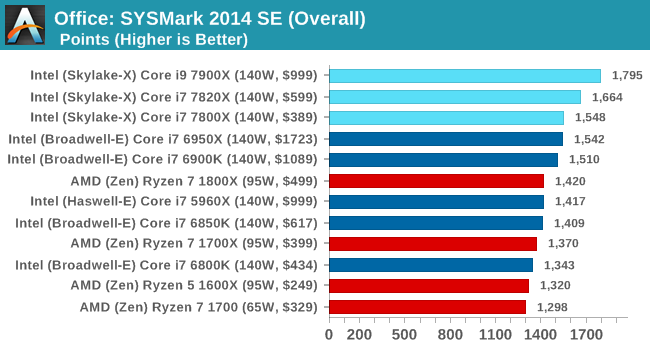










264 Comments
View All Comments
geekman1024 - Monday, June 19, 2017 - link
Zen is winning in one department: Price.Lolimaster - Tuesday, June 20, 2017 - link
Ryzen has a sick efficiency at lower clocks, that Ryzen 7 1700 65w can de undervolted further more and make it a 50w 3Ghz monster.sir_tech - Monday, June 19, 2017 - link
Why there are no power consumption charts in the review? Also, you should have gone ahead and post the gaming performance charts also just like Ryzen reviews.While the MSRP is high the actual retail price for Ryzen processors retail prices are much lower now.
Ryzen 7 1800x - $439 (MSRP - $499)
Ryzen 7 1700x - $349 (MSRP - $399)
Ryzen 7 1700 - $299 (MSRP - $329)
Ryzen 5 1600x - $229 (MSRP - $249)
Ryan Smith - Monday, June 19, 2017 - link
"Why there are no power consumption charts in the review?"Please refresh the conclusion.=)
"Also, you should have gone ahead and post the gaming performance charts also just like Ryzen reviews."
The BIOS updates have come so late that we don't even have a complete dataset for the new BIOSes. Ian had just enough time to make sure they were still screwy, and then was on a plane. We're going to need to sit down and completely redo all the Skylake-X chips once the platform stabilizes to the point where our results won't be immediately invalidated.
cheshirster - Monday, June 19, 2017 - link
Your DDR4-2400 tests of 1800X and 1600X are already invalidated.And RoTR
There was no problem with publishing bad gaming results for AMD.
What's the problem with 2066?
Ryan Smith - Monday, June 19, 2017 - link
If we had a complete, up-to-date dataset to publish, and time to write it up, we would have. If only to showcase why eager gamers should wait for the platform to mature a bit.cheshirster - Monday, June 19, 2017 - link
Sorry, with this text:"Our GTX1080 seems to be hit the hardest out of our four GPUs, as well as Civilization 6, the second Rise of the Tomb Raider test, and Rocket League on all GPUs. As a result, we only posted a minor selection of results, most of which show good parity at 4K"
+ ryzen bad fullhd results in RoTR and Rocket League fully published.
You are going straigh to the Hall of Fame of typical brand loyalists.
jospoortvliet - Thursday, June 22, 2017 - link
Well the state of Ryzen wasn't as bad as this and it isn't like it was not pointed out in this review.Also I am sure other benchmarks were also affected making Intel look worse in benchmark databases thanks to their rush job...
bongey - Wednesday, August 2, 2017 - link
Yep you bashed Ryzen in gaming in your review, quit lying."Gaming Performance, particularly towards 240 Hz gaming, is being questioned,"
Gasaraki88 - Monday, June 19, 2017 - link
Everything is on default, no overclocking.